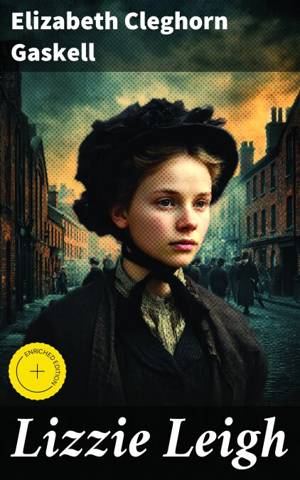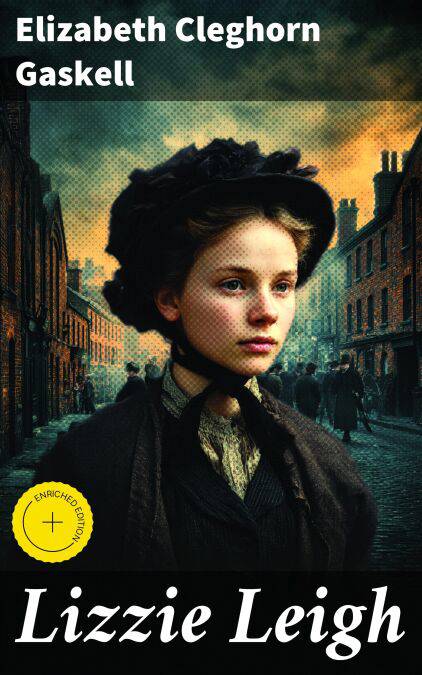
- Retrait en 2 heures
- Assortiment impressionnant
- Paiement sécurisé
- Toujours un magasin près de chez vous
- Retrait gratuit dans votre magasin Club
- 7.000.0000 titres dans notre catalogue
- Payer en toute sécurité
- Toujours un magasin près de chez vous
Lizzie Leigh EBOOK
Enriched edition. Exploring societal struggles and family dynamics in Victorian England
Elizabeth Cleghorn Gaskell
Ebook | Anglais
0,49 €
Description
In her poignant short story "Lizzie Leigh," Elizabeth Cleghorn Gaskell explores themes of social morality, female agency, and the complexities of familial relationships in Victorian England. Gaskell employs a realist narrative style characterized by rich, evocative descriptions and an empathetic tone, capturing the challenges faced by women in a patriarchal society. Through Lizzie's struggle with societal expectations and personal desires, Gaskell critiques the rigid moral codes of her time, making the story a profound commentary on gender and class dynamics, reflective of the broader socio-economic transformations occurring in 19th-century Britain. Elizabeth Cleghorn Gaskell (1810-1865) was a prominent novelist and biographer renowned for her detailed portrayals of industrial society in England. Gaskell's own experiences, including her close relationships with working-class individuals and her own encounters with societal judgment as a woman writer, deeply influenced her writing. "Lizzie Leigh" can be seen as a microcosm of Gaskell's broader concerns with women's rights and social justice, providing a window into the societal pressures that shaped women's lives during her era. For readers interested in the intersections of gender, morality, and class, "Lizzie Leigh" serves as a compelling introduction to Gaskell's rich literary landscape. This short yet impactful narrative invites reflection on the historical context of women's experiences while remaining strikingly relevant to contemporary discussions on social justice and personal identity. Gaskell's keen insight and masterful storytelling make this work a must-read for those seeking a deeper understanding of Victorian literature.
In this enriched edition, we have carefully created added value for your reading experience:
- A succinct Introduction situates the work's timeless appeal and themes.
- The Synopsis outlines the central plot, highlighting key developments without spoiling critical twists.
- A detailed Historical Context immerses you in the era's events and influences that shaped the writing.
- An Author Biography reveals milestones in the author's life, illuminating the personal insights behind the text.
- A thorough Analysis dissects symbols, motifs, and character arcs to unearth underlying meanings.
- Reflection questions prompt you to engage personally with the work's messages, connecting them to modern life.
- Hand‐picked Memorable Quotes shine a spotlight on moments of literary brilliance.
- Interactive footnotes clarify unusual references, historical allusions, and archaic phrases for an effortless, more informed read.
In this enriched edition, we have carefully created added value for your reading experience:
- A succinct Introduction situates the work's timeless appeal and themes.
- The Synopsis outlines the central plot, highlighting key developments without spoiling critical twists.
- A detailed Historical Context immerses you in the era's events and influences that shaped the writing.
- An Author Biography reveals milestones in the author's life, illuminating the personal insights behind the text.
- A thorough Analysis dissects symbols, motifs, and character arcs to unearth underlying meanings.
- Reflection questions prompt you to engage personally with the work's messages, connecting them to modern life.
- Hand‐picked Memorable Quotes shine a spotlight on moments of literary brilliance.
- Interactive footnotes clarify unusual references, historical allusions, and archaic phrases for an effortless, more informed read.
Spécifications
Parties prenantes
- Auteur(s) :
- Editeur:
Contenu
- Nombre de pages :
- 124
- Langue:
- Anglais
Caractéristiques
- EAN:
- 4057664640239
- Date de parution :
- 21-11-19
- Format:
- Ebook
- Protection digitale:
- Digital watermarking
- Format numérique:
- ePub

Seulement chez Librairie Club
Les avis
Nous publions uniquement les avis qui respectent les conditions requises. Consultez nos conditions pour les avis.





